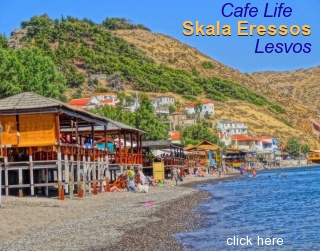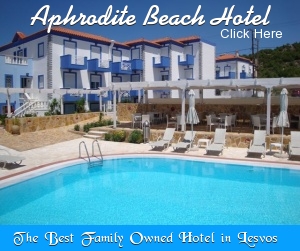All About Xidera
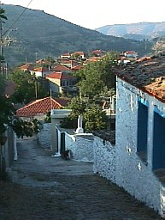 Why the village of Xidera would have a web page will surely confuse a lot
of people, particularly those from other more touristy villages on the
island of Lesvos. Even more confused will be the commercial web page designers
in Greece who know how much money can be made from creating a simple page.
They will ask themselves why someone would spend time doing a web page
for a village like Xidera, so far off the beaten track that few tourists
have ever been there (in fact the only foreigners who have come were most
likely visiting relatives). Why make a web page for a village with nothing
to sell, no hotels, in fact nothing to spend money on besides ouzo and
meze, when I could create a Santorini
page and sell thousands of dollars worth of advertising? (Hey, not
a bad idea). The reason is simple. Having spent parts of many summers there,
I know the village. I also know that nobody else would ever think of doing
a web site for Xidera because there is no way to capitalize on it and nobody
else is so in love with the village that they would even think about it.
Why the village of Xidera would have a web page will surely confuse a lot
of people, particularly those from other more touristy villages on the
island of Lesvos. Even more confused will be the commercial web page designers
in Greece who know how much money can be made from creating a simple page.
They will ask themselves why someone would spend time doing a web page
for a village like Xidera, so far off the beaten track that few tourists
have ever been there (in fact the only foreigners who have come were most
likely visiting relatives). Why make a web page for a village with nothing
to sell, no hotels, in fact nothing to spend money on besides ouzo and
meze, when I could create a Santorini
page and sell thousands of dollars worth of advertising? (Hey, not
a bad idea). The reason is simple. Having spent parts of many summers there,
I know the village. I also know that nobody else would ever think of doing
a web site for Xidera because there is no way to capitalize on it and nobody
else is so in love with the village that they would even think about it.
|
|
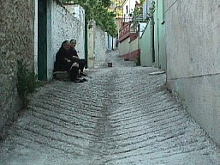 If Xidera was a traditional village with carefully controlled building
codes and a society that could be impacted by the introduction of tourism
then I would hesitate to expose its inhabitants to the travelers of the
world wide web. But despite the simple-ness of village life, there is little
to destroy, even if tourists were to travel the long dusty road to the
village that was not even paved until two years ago. Its not near a beach.
There are no hotels. No restaurants either. Its just a nice place for a
visit for an afternoon or evening. Its a place where life has gone on as
it has for hundreds of years.
If Xidera was a traditional village with carefully controlled building
codes and a society that could be impacted by the introduction of tourism
then I would hesitate to expose its inhabitants to the travelers of the
world wide web. But despite the simple-ness of village life, there is little
to destroy, even if tourists were to travel the long dusty road to the
village that was not even paved until two years ago. Its not near a beach.
There are no hotels. No restaurants either. Its just a nice place for a
visit for an afternoon or evening. Its a place where life has gone on as
it has for hundreds of years.
|
|
To other villages in Lesvos, Xidera
is considered the wild west. Its a village that has not had a policeman
for 400 years, has little or no interest in tourism and whose inhabitants
may go to Mytilni town once or twice a year for official reasons, but besides
work in their fields, spend little time outside the village. Its a closed
society where not only would a foreigner walking the streets draw attention,
but someone from a nearby village would too. |
|
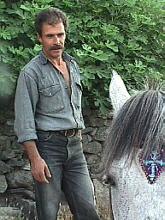 Xidera has around 350 full time inhabitants and while surrounding villages
are losing their populations to the cities of Mytilini and Athens, Xidera,
is growing. The reason is its self-sufficiency , or actually the self-sufficiency
of the individual farmers themselves. It costs very little to live in Xidera
and the farmers are able to support themselves through the sale of their
olives, milk and other products, mostly through the village co-operatives.
What they don't sell they eat, wear, drink or trade. Most, if not all the
men of the village are farmers. In fact the wealth of a man may be judged
in olive trees or sheep. There are farmers who are butchers, café
owners, carpenters, stone masons and other vocations. There is also a new
wine factory where the villagers can sell their grapes. The island of Lesvos
has been barren of grapes for the last several hundred years but the cloning
of a blight resistant strain has made the future look hopeful for the wine
drinkers and distillers. The factory in Xidera is an experiment, that should
it prove successful will not only improve the economy of the village, but
of the whole island.Whether this will be positive we will see. Xidera has around 350 full time inhabitants and while surrounding villages
are losing their populations to the cities of Mytilini and Athens, Xidera,
is growing. The reason is its self-sufficiency , or actually the self-sufficiency
of the individual farmers themselves. It costs very little to live in Xidera
and the farmers are able to support themselves through the sale of their
olives, milk and other products, mostly through the village co-operatives.
What they don't sell they eat, wear, drink or trade. Most, if not all the
men of the village are farmers. In fact the wealth of a man may be judged
in olive trees or sheep. There are farmers who are butchers, café
owners, carpenters, stone masons and other vocations. There is also a new
wine factory where the villagers can sell their grapes. The island of Lesvos
has been barren of grapes for the last several hundred years but the cloning
of a blight resistant strain has made the future look hopeful for the wine
drinkers and distillers. The factory in Xidera is an experiment, that should
it prove successful will not only improve the economy of the village, but
of the whole island.Whether this will be positive we will see.
|
|
 My friend Thanasis is known as 'the Australian'. He lived there for a few
years but came back to the village to marry and raise a family. He is now
the proud father of two sons and the owner of a cafeneon which was a part
of his wife's prika or dowry. Marriages are still arranged in Vatousa and
it is rare that a young woman is seen on the streets, much less in the
cafeneons, where her reputation may be tarnished and her parents find her
un-marketable in a place where marriage is a major business. This can be
difficult for the daughters of villagers who have returned after years
in Australia and know what freedom is. The girls may find themselves prisoners
in their own homes with parents who don't want to risk damaging the goods.
While our society might frown upon this practice, marriages seem to last
a lifetime, if only because the women are so happy to be out of their parents
clutches that the relative prison of matrimony seems the lesser of two
evils.
My friend Thanasis is known as 'the Australian'. He lived there for a few
years but came back to the village to marry and raise a family. He is now
the proud father of two sons and the owner of a cafeneon which was a part
of his wife's prika or dowry. Marriages are still arranged in Vatousa and
it is rare that a young woman is seen on the streets, much less in the
cafeneons, where her reputation may be tarnished and her parents find her
un-marketable in a place where marriage is a major business. This can be
difficult for the daughters of villagers who have returned after years
in Australia and know what freedom is. The girls may find themselves prisoners
in their own homes with parents who don't want to risk damaging the goods.
While our society might frown upon this practice, marriages seem to last
a lifetime, if only because the women are so happy to be out of their parents
clutches that the relative prison of matrimony seems the lesser of two
evils.
|
|
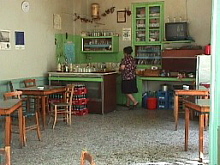 Village social life centers upon the cafeneon, at least as far as the men
are concerned. With 350 inhabitants the male population is roughly a third
and the average age is somewhere around sixty. Some of the villagers are
retired returnees from Athens or abroad. Since most of the men wake up
before the sunrise to work in the fields before the day becomes too hot,
there is a lot of leisure time in the afternoon and the early evenings.
Luckily for the one hundred seventeen men of the village there are seven
cafeneons or roughly one for each 16.7 males. Since the amount of males
is not cleanly divisible by the number of cafeneons the men circulate from
café to café, joining whatever group suits their mood or
whoever they need to talk with. Village social life centers upon the cafeneon, at least as far as the men
are concerned. With 350 inhabitants the male population is roughly a third
and the average age is somewhere around sixty. Some of the villagers are
retired returnees from Athens or abroad. Since most of the men wake up
before the sunrise to work in the fields before the day becomes too hot,
there is a lot of leisure time in the afternoon and the early evenings.
Luckily for the one hundred seventeen men of the village there are seven
cafeneons or roughly one for each 16.7 males. Since the amount of males
is not cleanly divisible by the number of cafeneons the men circulate from
café to café, joining whatever group suits their mood or
whoever they need to talk with.
|
|
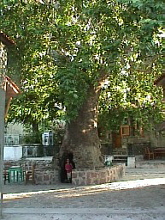 Four of the seven cafeneons are in the main platia where the men can sit
in the shade of the giant hollow platanos tree that is used for storage.
The younger men hang out at what is known as the psistaria or grill.
It is called this because in the summer and on special occasions
they roast lamb in the covered outdoor grill on the premises. But all the cafeneons are known for the people who run them and this is run by Vagelis with a little help from his mom who is about 80 years old. While the
TV in the other cafeneons are showing mostly the news, movies, serials
and soap operas, the psistaria is usually tuned to the Greek MTV
though not everyone watches it. As one discovers by going to this or any
of the other cafeneons the proprietors don't need your money and if the
conversation is flowing, many times the ouzo is free.
Four of the seven cafeneons are in the main platia where the men can sit
in the shade of the giant hollow platanos tree that is used for storage.
The younger men hang out at what is known as the psistaria or grill.
It is called this because in the summer and on special occasions
they roast lamb in the covered outdoor grill on the premises. But all the cafeneons are known for the people who run them and this is run by Vagelis with a little help from his mom who is about 80 years old. While the
TV in the other cafeneons are showing mostly the news, movies, serials
and soap operas, the psistaria is usually tuned to the Greek MTV
though not everyone watches it. As one discovers by going to this or any
of the other cafeneons the proprietors don't need your money and if the
conversation is flowing, many times the ouzo is free.
|
|
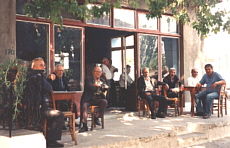 The cafeneon across the street is where Andrea's uncle Andreas, a retired
taxi driver hangs out. This seems to be the most popular place for the
older men. The owner is quick to refill the ouzo of any foreigner (usually
me) with a story to tell. A couple years ago we sat and told him of the
wondrous heirloom vegetables that are available in America and of the yellow
and purple tomatoes and many variety of peppers we had in our garden. He
became intrigued and asked us to send some to him, particularly the habenero
peppers which interested him because we told him they were 30,000 times
hotter then any pepper he had ever eaten. We warned him of their potency
and made him promise not to try to impress his friends by popping the whole
thing into his mouth. We sent them to Thanasis the Australian who unfortunately
gave them to the wrong cafeneon owner who was found dead in his garden
clutching a habanero stem. The cafeneon across the street is where Andrea's uncle Andreas, a retired
taxi driver hangs out. This seems to be the most popular place for the
older men. The owner is quick to refill the ouzo of any foreigner (usually
me) with a story to tell. A couple years ago we sat and told him of the
wondrous heirloom vegetables that are available in America and of the yellow
and purple tomatoes and many variety of peppers we had in our garden. He
became intrigued and asked us to send some to him, particularly the habenero
peppers which interested him because we told him they were 30,000 times
hotter then any pepper he had ever eaten. We warned him of their potency
and made him promise not to try to impress his friends by popping the whole
thing into his mouth. We sent them to Thanasis the Australian who unfortunately
gave them to the wrong cafeneon owner who was found dead in his garden
clutching a habanero stem.
|
|
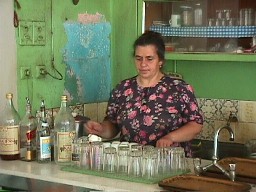 Andrea's cousin and her husband Grigoris own the smallest cafeneon on the corner
of the platia. The cafe is usually full of people and serves the best mezedes
of the four. Grigoris is kind of an elegant guy who speaks more English than he lets on. Actually it is surprising how many people do speak English but are afraid to, thinking their language skills have become too rusty over the years to even risk trying. But my Greek can be so bad that some people finally talk to me in English since they figure their English can't be any worse than my Greek and they have no idea what I am trying to say. It's sort of like Jesus, you know, curing someone who has not spoken in
40 years. But anyway, Grigoris does speak English and since his is the cafeneon right next to the Yakovitis Digital Art Museum, it is the easiest one to find. The fourth cafeneon is usually empty but has an old
wurlitzer jukebox that has not been plugged in since I have been coming
to the village. The fifth cafeneon is at the entrance of the platia and
has the look of a hotel cafeteria and in fact I have never set foot inside
it, even after coming to the village for almost twenty years.
Andrea's cousin and her husband Grigoris own the smallest cafeneon on the corner
of the platia. The cafe is usually full of people and serves the best mezedes
of the four. Grigoris is kind of an elegant guy who speaks more English than he lets on. Actually it is surprising how many people do speak English but are afraid to, thinking their language skills have become too rusty over the years to even risk trying. But my Greek can be so bad that some people finally talk to me in English since they figure their English can't be any worse than my Greek and they have no idea what I am trying to say. It's sort of like Jesus, you know, curing someone who has not spoken in
40 years. But anyway, Grigoris does speak English and since his is the cafeneon right next to the Yakovitis Digital Art Museum, it is the easiest one to find. The fourth cafeneon is usually empty but has an old
wurlitzer jukebox that has not been plugged in since I have been coming
to the village. The fifth cafeneon is at the entrance of the platia and
has the look of a hotel cafeteria and in fact I have never set foot inside
it, even after coming to the village for almost twenty years.
|
|
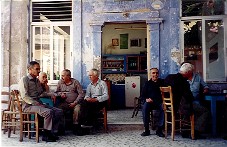 My favorite two cafeneons belong to Thanasis the Australian and, directly
across the tiny street, the cafeneon of our Aunt Avglaia and Uncle Panayotis,
made famous by Jelly Hatzidimitriou’s book: 39 Cafeneons and a Barbershop.
Unfortunately the picture of our aunt is mislabeled as Michos in the Yera
district (#82) and so any recognition or business she would have gotten
has been sent to the other side of the island. Not that she would care,
but now they have begun to sell postcards of her all over the island and
she worries about the hordes of tourists who will waste their time searching
for her cafeneon in the town of Michos, (which I could not even find on
the map).
My favorite two cafeneons belong to Thanasis the Australian and, directly
across the tiny street, the cafeneon of our Aunt Avglaia and Uncle Panayotis,
made famous by Jelly Hatzidimitriou’s book: 39 Cafeneons and a Barbershop.
Unfortunately the picture of our aunt is mislabeled as Michos in the Yera
district (#82) and so any recognition or business she would have gotten
has been sent to the other side of the island. Not that she would care,
but now they have begun to sell postcards of her all over the island and
she worries about the hordes of tourists who will waste their time searching
for her cafeneon in the town of Michos, (which I could not even find on
the map).
|
|
 Avglaia’s husband Panayotis is the village butcher. His tiny shop was across
the street from the cafeneon until he built a new one attached to his house.
Many times we will be sitting happily drinking our ouzo and eating our
delicious meze when we will see a man walking a goat coming up the street.
Panayotis excuses himself or if his son Stavros is there sends him to slaughter
the animal. I have watched this many times in drunken facination and have
videotaped the entire process. In fact I have shown this tape so many times
to my friends in America that I believe I could slaughter and peel a goat
or sheep if I had to. For those who are interested in the graphic details
and the even more graphic pictures click here.
For the rest of you I will spare the blood and gore.
Avglaia’s husband Panayotis is the village butcher. His tiny shop was across
the street from the cafeneon until he built a new one attached to his house.
Many times we will be sitting happily drinking our ouzo and eating our
delicious meze when we will see a man walking a goat coming up the street.
Panayotis excuses himself or if his son Stavros is there sends him to slaughter
the animal. I have watched this many times in drunken facination and have
videotaped the entire process. In fact I have shown this tape so many times
to my friends in America that I believe I could slaughter and peel a goat
or sheep if I had to. For those who are interested in the graphic details
and the even more graphic pictures click here.
For the rest of you I will spare the blood and gore.
Panayotis is a prankster who asks clever
questions that when you answer them make you feel like you sound foolish.
He is quick to offer an ouzo in an effort to loosen your tongue and engage
you in conversation. He sits with his pals for hours drinking glass after
glass as Avglaia brings a continuous procession of meze plates that are
refilled before they are ever finished. Old men pass in the street, some
joining Panayotis and his parea (cohorts) or entering Thanasis place across
the street for a game of cards with the village priest and an ouzo or two. |
|
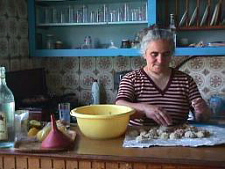 What makes Avglaia’s so great is her cooking. She has a tiny gas stove
in the corner from which she makes some of the finest meals on the island.
All of her meals are simple, healthy and delicious, using ingredients from
their farm (vegetables, olive oil, eggs,) and from the butcher shop.
There is no menu. She asks us “Would you like me to make fried eggplant?
How about some paidakia (lamb chops)?” She always serves a beautiful salad
of fresh tomatoes, cucumbers, onions, arugala and a giant slab of home-made
feta cheese, covered in olive oil from her trees and the oregano she picked
in the mountains. There is usually some kind of meat or vegetable dish
she has cooked a pot of for the featured meze of the day, that she serves
to the old men who don't have a wife to cook for them or if they do, prefer
to eat in the cafeneon.
What makes Avglaia’s so great is her cooking. She has a tiny gas stove
in the corner from which she makes some of the finest meals on the island.
All of her meals are simple, healthy and delicious, using ingredients from
their farm (vegetables, olive oil, eggs,) and from the butcher shop.
There is no menu. She asks us “Would you like me to make fried eggplant?
How about some paidakia (lamb chops)?” She always serves a beautiful salad
of fresh tomatoes, cucumbers, onions, arugala and a giant slab of home-made
feta cheese, covered in olive oil from her trees and the oregano she picked
in the mountains. There is usually some kind of meat or vegetable dish
she has cooked a pot of for the featured meze of the day, that she serves
to the old men who don't have a wife to cook for them or if they do, prefer
to eat in the cafeneon.
|
|
 Thanasis is one of the few people who confides in me, not surprising because
he is one of the few people who speaks English (and my Greek does not have
the depth that any conversation that would be considered confidential would
require). His years in Australia have made him aware of the universe that
exists outside of the village and he wishes there were more opportunities
for expression here. But he loves village life and sings its praises for
me. In June and July when the sheep must be milked first thing in the morning
and again at sundown, he can only be found in the cafeneon in the daytime.
That's because as soon as the hottest part of the day has passed he saddles
his horse and rides two hours over the mountains to his land in the hills
near Mesotopos to milk them. There he stays in a stone hut so they can
be milked again in the morning before he rides back to do his chores in
the village where he has his vegetables and the cafeneon.
Thanasis is one of the few people who confides in me, not surprising because
he is one of the few people who speaks English (and my Greek does not have
the depth that any conversation that would be considered confidential would
require). His years in Australia have made him aware of the universe that
exists outside of the village and he wishes there were more opportunities
for expression here. But he loves village life and sings its praises for
me. In June and July when the sheep must be milked first thing in the morning
and again at sundown, he can only be found in the cafeneon in the daytime.
That's because as soon as the hottest part of the day has passed he saddles
his horse and rides two hours over the mountains to his land in the hills
near Mesotopos to milk them. There he stays in a stone hut so they can
be milked again in the morning before he rides back to do his chores in
the village where he has his vegetables and the cafeneon.
“Ahhhh Matheos, to be out there under
the stars, with no lights and only the bells of the sheep it is so peaceful.”
He admits he also has a small radio.
|
|
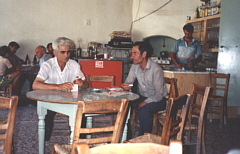 “Bring
tourists here Matheos”, he tells me. Not that he wants to rake in all the
tourist dollars but because he wants people to talk to from outside the
village. What can I tell him? The tourists come for the beaches, the tavernas,
the historic stone houses of the traditional villages. What can we offer
them in Xidera besides ouzo, delicious mezedes, hospitality and a slice
of life that has remained unchanged for so long? Tourists want mousaka
and pastitzio, not a glass of ouzo and a sheep's spleen. There is nothing
in Xidera for tourists except authenticity and only a special breed of
traveler seeks that. “Bring
tourists here Matheos”, he tells me. Not that he wants to rake in all the
tourist dollars but because he wants people to talk to from outside the
village. What can I tell him? The tourists come for the beaches, the tavernas,
the historic stone houses of the traditional villages. What can we offer
them in Xidera besides ouzo, delicious mezedes, hospitality and a slice
of life that has remained unchanged for so long? Tourists want mousaka
and pastitzio, not a glass of ouzo and a sheep's spleen. There is nothing
in Xidera for tourists except authenticity and only a special breed of
traveler seeks that.
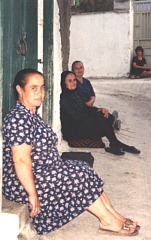 While
the men are in the cafeneons what are the women doing? For the most part
household stuff. They also do a variety of crafts like spinning wool which
comes from their own sheep, or making cheese. They keep pretty busy allday.
When work is done, for entertainment they sit outside their gates singularly
or in groups and talk among themselves and with the villagers who pass
by. This takes place towards dusk when the days work is over and
the air is cooler. They will continue to talk until it gets too dark to
see and then they return to their homes to await the return of their husbands
from the cafeneon. Most of the older women continue the tradition of wearing
black after the death of a loved one, a tradition that has all but disappeared
in the cities and less culturally bound areas of Greece. While
the men are in the cafeneons what are the women doing? For the most part
household stuff. They also do a variety of crafts like spinning wool which
comes from their own sheep, or making cheese. They keep pretty busy allday.
When work is done, for entertainment they sit outside their gates singularly
or in groups and talk among themselves and with the villagers who pass
by. This takes place towards dusk when the days work is over and
the air is cooler. They will continue to talk until it gets too dark to
see and then they return to their homes to await the return of their husbands
from the cafeneon. Most of the older women continue the tradition of wearing
black after the death of a loved one, a tradition that has all but disappeared
in the cities and less culturally bound areas of Greece.
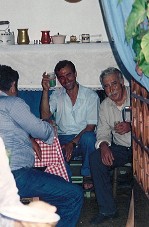 In
the summer they make the trachana which is their winter staple. It's a
mixture of wheat and sheep's milk that is cooked in giant pots and then
formed into little bowls which are placed upside down for drying. The process
of making the trachana includes a festive atmosphere which friends, family
and ouzo all play a major part as is evident from this photo of Thanasis
at his mother's house. If you come to the village in the fall everyone's
hands are black from collecting wild walnuts. Late fall is the time of
picking the olives, taking them to Andonis’ factory in Pterounda and making
olive oil. A quarter of all Greece's olive oil comes from the island of
Lesvos and Xidera provides its share. In
the summer they make the trachana which is their winter staple. It's a
mixture of wheat and sheep's milk that is cooked in giant pots and then
formed into little bowls which are placed upside down for drying. The process
of making the trachana includes a festive atmosphere which friends, family
and ouzo all play a major part as is evident from this photo of Thanasis
at his mother's house. If you come to the village in the fall everyone's
hands are black from collecting wild walnuts. Late fall is the time of
picking the olives, taking them to Andonis’ factory in Pterounda and making
olive oil. A quarter of all Greece's olive oil comes from the island of
Lesvos and Xidera provides its share.
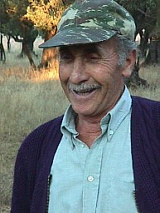 November
is also the time for making Raki from the leftover grapes. The best raki
in the village comes from Andrea's Uncle Mitzo who was famous for it before
his stomach began bothering him and he was unable to drink it. Raki is
stronger then ouzo and similar in taste to moonshine, though it is judged
by its smoothness as well as its effects. I can vouch for Uncle Mitzo’s
raki, which he calls ouzo even though it does not have the anise taste.
One glass I am buzzed. Two I am in that place where drinkers like to be.
Anymore then that I cannot remember anything except that I enjoyed myself
immensely. I have never gotten a hangover from Raki. There is a big clay
still in Mitzo’s backyard and he urges me to join him in the making of
the sacred drink some November. He calls the still a loulas and
sings the rembetika song: November
is also the time for making Raki from the leftover grapes. The best raki
in the village comes from Andrea's Uncle Mitzo who was famous for it before
his stomach began bothering him and he was unable to drink it. Raki is
stronger then ouzo and similar in taste to moonshine, though it is judged
by its smoothness as well as its effects. I can vouch for Uncle Mitzo’s
raki, which he calls ouzo even though it does not have the anise taste.
One glass I am buzzed. Two I am in that place where drinkers like to be.
Anymore then that I cannot remember anything except that I enjoyed myself
immensely. I have never gotten a hangover from Raki. There is a big clay
still in Mitzo’s backyard and he urges me to join him in the making of
the sacred drink some November. He calls the still a loulas and
sings the rembetika song:
Otan kapnizi oh loulas
Esi then prepi na milas
When you light the loulas
You are unable to speak
Though the unofficial rembetika translation is:
When you smoke the pipe
You cannot speak
Regardless, Mitzo at eighty is a walking advertisement
for the Xidera lifestyle, (despite no longer being able to drink).
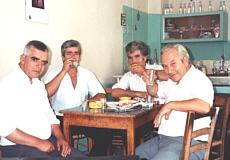 There
is something about the inhabitants of the village that tells you they are
not interested in insincerity. A couple years ago we were in Eressos and
we ran into one of the villagers there who was sitting in a restaurant
while his friend was swimming. We joined him for a beer and we compared
our lives in America and Xidera. The restaurant sound system was playing
one excellent song after another and I asked the bearded proprietor what
it was, a tape or a radio station. There
is something about the inhabitants of the village that tells you they are
not interested in insincerity. A couple years ago we were in Eressos and
we ran into one of the villagers there who was sitting in a restaurant
while his friend was swimming. We joined him for a beer and we compared
our lives in America and Xidera. The restaurant sound system was playing
one excellent song after another and I asked the bearded proprietor what
it was, a tape or a radio station.
“It's melody” he replied flippantly.
The Xideriotis blew up. “What the hell kind of an answer
is that? The man asked you a simple question about the music and you try
to humiliate him with your answer. That is pure arrogance and it is shameful
behavior, especially to a guest. Apologize to him right now.”
“Signomi”, said the restauranteur. “Enei radio.”
It's funny when we run into someone from Xidera in another
village on the island. It's like seeing someone from America or another
country who is so out of context that for awhile you can't even figure
out who he is. Once we realize that he is from the village it is like a
reunion and even if we have only greeted him in passing in Xidera, from
that moment on we are friends. Last summer while we were in the main square
in Eressos we spotted a familiar face. At first we thought he was from
Sifnos but then we realized he was from Xidera. He had come to sell cheese
to the tourists. We were so excited to see him that we convinced my mother
to buy several pounds as a gift to bring back to America (even though it
smelled bad and leaked oil over everything and ruined her clothes).
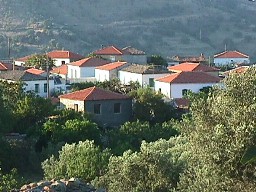 The
hills surrounding Xidera are filled with wonders. There is a sacred pine
grove that covers a small mountain. There is a spring of fresh water in
the valley. There are endless fields and olive groves. The sound of goats,
sheep and donkeys fill the air at sunset when they return from the hills
to their pens just below the village. At night you can see the lights of
Antissa and more stars then you thought existed. It's a timeless place
that will never change no matter how many tourists make their way up the
mountain road for a walk around the village and perhaps an ouzo and lamb's
spleen. The
hills surrounding Xidera are filled with wonders. There is a sacred pine
grove that covers a small mountain. There is a spring of fresh water in
the valley. There are endless fields and olive groves. The sound of goats,
sheep and donkeys fill the air at sunset when they return from the hills
to their pens just below the village. At night you can see the lights of
Antissa and more stars then you thought existed. It's a timeless place
that will never change no matter how many tourists make their way up the
mountain road for a walk around the village and perhaps an ouzo and lamb's
spleen.
*I first wrote this article back in the nineties, thinking what a novelty it was to make a website about a place that no tourist would think about going to. What did I know? Several tourists a summer made their way to Xidera in the years that followed and then, they built a winery, with state-of-the-art equipment, and began making what may be the best wine in Greece. Then in 2008 they opened the first digital art museum for Georgios Iakovitis, one of Greece's
greatest
painters who was born in Xidera.
See Methymnaos Winery and Iakovitis Digital Art Museum
Return to Xidera Index
|
|

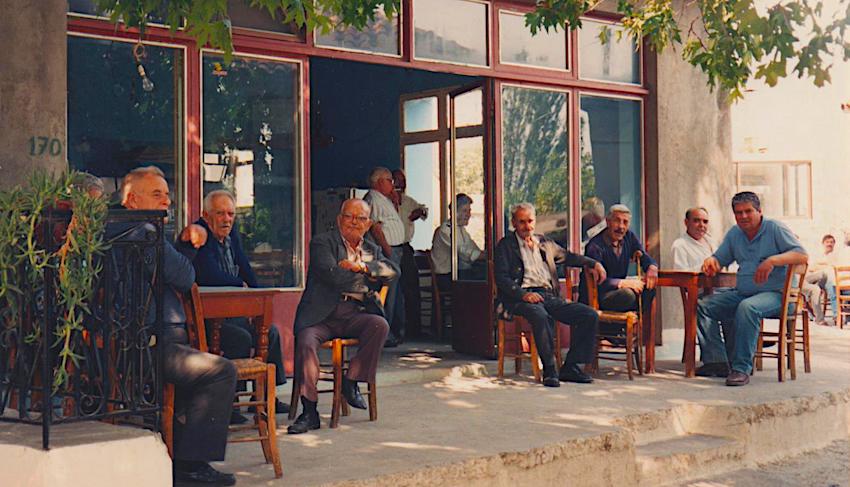
 Why the village of Xidera would have a web page will surely confuse a lot
of people, particularly those from other more touristy villages on the
island of Lesvos. Even more confused will be the commercial web page designers
in Greece who know how much money can be made from creating a simple page.
They will ask themselves why someone would spend time doing a web page
for a village like Xidera, so far off the beaten track that few tourists
have ever been there (in fact the only foreigners who have come were most
likely visiting relatives). Why make a web page for a village with nothing
to sell, no hotels, in fact nothing to spend money on besides ouzo and
meze, when I could create a
Why the village of Xidera would have a web page will surely confuse a lot
of people, particularly those from other more touristy villages on the
island of Lesvos. Even more confused will be the commercial web page designers
in Greece who know how much money can be made from creating a simple page.
They will ask themselves why someone would spend time doing a web page
for a village like Xidera, so far off the beaten track that few tourists
have ever been there (in fact the only foreigners who have come were most
likely visiting relatives). Why make a web page for a village with nothing
to sell, no hotels, in fact nothing to spend money on besides ouzo and
meze, when I could create a  If Xidera was a traditional village with carefully controlled building
codes and a society that could be impacted by the introduction of tourism
then I would hesitate to expose its inhabitants to the travelers of the
world wide web. But despite the simple-ness of village life, there is little
to destroy, even if tourists were to travel the long dusty road to the
village that was not even paved until two years ago. Its not near a beach.
There are no hotels. No restaurants either. Its just a nice place for a
visit for an afternoon or evening. Its a place where life has gone on as
it has for hundreds of years.
If Xidera was a traditional village with carefully controlled building
codes and a society that could be impacted by the introduction of tourism
then I would hesitate to expose its inhabitants to the travelers of the
world wide web. But despite the simple-ness of village life, there is little
to destroy, even if tourists were to travel the long dusty road to the
village that was not even paved until two years ago. Its not near a beach.
There are no hotels. No restaurants either. Its just a nice place for a
visit for an afternoon or evening. Its a place where life has gone on as
it has for hundreds of years. Xidera has around 350 full time inhabitants and while surrounding villages
are losing their populations to the cities of Mytilini and Athens, Xidera,
is growing. The reason is its self-sufficiency , or actually the self-sufficiency
of the individual farmers themselves. It costs very little to live in Xidera
and the farmers are able to support themselves through the sale of their
olives, milk and other products, mostly through the village co-operatives.
What they don't sell they eat, wear, drink or trade. Most, if not all the
men of the village are farmers. In fact the wealth of a man may be judged
in olive trees or sheep. There are farmers who are butchers, café
owners, carpenters, stone masons and other vocations. There is also a new
wine factory where the villagers can sell their grapes. The island of Lesvos
has been barren of grapes for the last several hundred years but the cloning
of a blight resistant strain has made the future look hopeful for the wine
drinkers and distillers. The factory in Xidera is an experiment, that should
it prove successful will not only improve the economy of the village, but
of the whole island.Whether this will be positive we will see.
Xidera has around 350 full time inhabitants and while surrounding villages
are losing their populations to the cities of Mytilini and Athens, Xidera,
is growing. The reason is its self-sufficiency , or actually the self-sufficiency
of the individual farmers themselves. It costs very little to live in Xidera
and the farmers are able to support themselves through the sale of their
olives, milk and other products, mostly through the village co-operatives.
What they don't sell they eat, wear, drink or trade. Most, if not all the
men of the village are farmers. In fact the wealth of a man may be judged
in olive trees or sheep. There are farmers who are butchers, café
owners, carpenters, stone masons and other vocations. There is also a new
wine factory where the villagers can sell their grapes. The island of Lesvos
has been barren of grapes for the last several hundred years but the cloning
of a blight resistant strain has made the future look hopeful for the wine
drinkers and distillers. The factory in Xidera is an experiment, that should
it prove successful will not only improve the economy of the village, but
of the whole island.Whether this will be positive we will see. My friend Thanasis is known as 'the Australian'. He lived there for a few
years but came back to the village to marry and raise a family. He is now
the proud father of two sons and the owner of a cafeneon which was a part
of his wife's prika or dowry. Marriages are still arranged in Vatousa and
it is rare that a young woman is seen on the streets, much less in the
cafeneons, where her reputation may be tarnished and her parents find her
un-marketable in a place where marriage is a major business. This can be
difficult for the daughters of villagers who have returned after years
in Australia and know what freedom is. The girls may find themselves prisoners
in their own homes with parents who don't want to risk damaging the goods.
While our society might frown upon this practice, marriages seem to last
a lifetime, if only because the women are so happy to be out of their parents
clutches that the relative prison of matrimony seems the lesser of two
evils.
My friend Thanasis is known as 'the Australian'. He lived there for a few
years but came back to the village to marry and raise a family. He is now
the proud father of two sons and the owner of a cafeneon which was a part
of his wife's prika or dowry. Marriages are still arranged in Vatousa and
it is rare that a young woman is seen on the streets, much less in the
cafeneons, where her reputation may be tarnished and her parents find her
un-marketable in a place where marriage is a major business. This can be
difficult for the daughters of villagers who have returned after years
in Australia and know what freedom is. The girls may find themselves prisoners
in their own homes with parents who don't want to risk damaging the goods.
While our society might frown upon this practice, marriages seem to last
a lifetime, if only because the women are so happy to be out of their parents
clutches that the relative prison of matrimony seems the lesser of two
evils. Village social life centers upon the cafeneon, at least as far as the men
are concerned. With 350 inhabitants the male population is roughly a third
and the average age is somewhere around sixty. Some of the villagers are
retired returnees from Athens or abroad. Since most of the men wake up
before the sunrise to work in the fields before the day becomes too hot,
there is a lot of leisure time in the afternoon and the early evenings.
Luckily for the one hundred seventeen men of the village there are seven
cafeneons or roughly one for each 16.7 males. Since the amount of males
is not cleanly divisible by the number of cafeneons the men circulate from
café to café, joining whatever group suits their mood or
whoever they need to talk with.
Village social life centers upon the cafeneon, at least as far as the men
are concerned. With 350 inhabitants the male population is roughly a third
and the average age is somewhere around sixty. Some of the villagers are
retired returnees from Athens or abroad. Since most of the men wake up
before the sunrise to work in the fields before the day becomes too hot,
there is a lot of leisure time in the afternoon and the early evenings.
Luckily for the one hundred seventeen men of the village there are seven
cafeneons or roughly one for each 16.7 males. Since the amount of males
is not cleanly divisible by the number of cafeneons the men circulate from
café to café, joining whatever group suits their mood or
whoever they need to talk with. Four of the seven cafeneons are in the main platia where the men can sit
in the shade of the giant hollow platanos tree that is used for storage.
The younger men hang out at what is known as the psistaria or grill.
It is called this because in the summer and on special occasions
they roast lamb in the covered outdoor grill on the premises. But all the cafeneons are known for the people who run them and this is run by Vagelis with a little help from his mom who is about 80 years old. While the
TV in the other cafeneons are showing mostly the news, movies, serials
and soap operas, the psistaria is usually tuned to the Greek MTV
though not everyone watches it. As one discovers by going to this or any
of the other cafeneons the proprietors don't need your money and if the
conversation is flowing, many times the ouzo is free.
Four of the seven cafeneons are in the main platia where the men can sit
in the shade of the giant hollow platanos tree that is used for storage.
The younger men hang out at what is known as the psistaria or grill.
It is called this because in the summer and on special occasions
they roast lamb in the covered outdoor grill on the premises. But all the cafeneons are known for the people who run them and this is run by Vagelis with a little help from his mom who is about 80 years old. While the
TV in the other cafeneons are showing mostly the news, movies, serials
and soap operas, the psistaria is usually tuned to the Greek MTV
though not everyone watches it. As one discovers by going to this or any
of the other cafeneons the proprietors don't need your money and if the
conversation is flowing, many times the ouzo is free. The cafeneon across the street is where Andrea's uncle Andreas, a retired
taxi driver hangs out. This seems to be the most popular place for the
older men. The owner is quick to refill the ouzo of any foreigner (usually
me) with a story to tell. A couple years ago we sat and told him of the
wondrous heirloom vegetables that are available in America and of the yellow
and purple tomatoes and many variety of peppers we had in our garden. He
became intrigued and asked us to send some to him, particularly the habenero
peppers which interested him because we told him they were 30,000 times
hotter then any pepper he had ever eaten. We warned him of their potency
and made him promise not to try to impress his friends by popping the whole
thing into his mouth. We sent them to Thanasis the Australian who unfortunately
gave them to the wrong cafeneon owner who was found dead in his garden
clutching a habanero stem.
The cafeneon across the street is where Andrea's uncle Andreas, a retired
taxi driver hangs out. This seems to be the most popular place for the
older men. The owner is quick to refill the ouzo of any foreigner (usually
me) with a story to tell. A couple years ago we sat and told him of the
wondrous heirloom vegetables that are available in America and of the yellow
and purple tomatoes and many variety of peppers we had in our garden. He
became intrigued and asked us to send some to him, particularly the habenero
peppers which interested him because we told him they were 30,000 times
hotter then any pepper he had ever eaten. We warned him of their potency
and made him promise not to try to impress his friends by popping the whole
thing into his mouth. We sent them to Thanasis the Australian who unfortunately
gave them to the wrong cafeneon owner who was found dead in his garden
clutching a habanero stem. Andrea's cousin and her husband Grigoris own the smallest cafeneon on the corner
of the platia. The cafe is usually full of people and serves the best mezedes
of the four. Grigoris is kind of an elegant guy who speaks more English than he lets on. Actually it is surprising how many people do speak English but are afraid to, thinking their language skills have become too rusty over the years to even risk trying. But my Greek can be so bad that some people finally talk to me in English since they figure their English can't be any worse than my Greek and they have no idea what I am trying to say. It's sort of like Jesus, you know, curing someone who has not spoken in
40 years. But anyway, Grigoris does speak English and since his is the cafeneon right next to the
Andrea's cousin and her husband Grigoris own the smallest cafeneon on the corner
of the platia. The cafe is usually full of people and serves the best mezedes
of the four. Grigoris is kind of an elegant guy who speaks more English than he lets on. Actually it is surprising how many people do speak English but are afraid to, thinking their language skills have become too rusty over the years to even risk trying. But my Greek can be so bad that some people finally talk to me in English since they figure their English can't be any worse than my Greek and they have no idea what I am trying to say. It's sort of like Jesus, you know, curing someone who has not spoken in
40 years. But anyway, Grigoris does speak English and since his is the cafeneon right next to the  My favorite two cafeneons belong to Thanasis the Australian and, directly
across the tiny street, the cafeneon of our Aunt Avglaia and Uncle Panayotis,
made famous by Jelly Hatzidimitriou’s book: 39 Cafeneons and a Barbershop.
Unfortunately the picture of our aunt is mislabeled as Michos in the Yera
district (#82) and so any recognition or business she would have gotten
has been sent to the other side of the island. Not that she would care,
but now they have begun to sell postcards of her all over the island and
she worries about the hordes of tourists who will waste their time searching
for her cafeneon in the town of Michos, (which I could not even find on
the map).
My favorite two cafeneons belong to Thanasis the Australian and, directly
across the tiny street, the cafeneon of our Aunt Avglaia and Uncle Panayotis,
made famous by Jelly Hatzidimitriou’s book: 39 Cafeneons and a Barbershop.
Unfortunately the picture of our aunt is mislabeled as Michos in the Yera
district (#82) and so any recognition or business she would have gotten
has been sent to the other side of the island. Not that she would care,
but now they have begun to sell postcards of her all over the island and
she worries about the hordes of tourists who will waste their time searching
for her cafeneon in the town of Michos, (which I could not even find on
the map). Avglaia’s husband Panayotis is the village butcher. His tiny shop was across
the street from the cafeneon until he built a new one attached to his house.
Many times we will be sitting happily drinking our ouzo and eating our
delicious meze when we will see a man walking a goat coming up the street.
Panayotis excuses himself or if his son Stavros is there sends him to slaughter
the animal. I have watched this many times in drunken facination and have
videotaped the entire process. In fact I have shown this tape so many times
to my friends in America that I believe I could slaughter and peel a goat
or sheep if I had to. For those who are interested in the graphic details
and the even more
Avglaia’s husband Panayotis is the village butcher. His tiny shop was across
the street from the cafeneon until he built a new one attached to his house.
Many times we will be sitting happily drinking our ouzo and eating our
delicious meze when we will see a man walking a goat coming up the street.
Panayotis excuses himself or if his son Stavros is there sends him to slaughter
the animal. I have watched this many times in drunken facination and have
videotaped the entire process. In fact I have shown this tape so many times
to my friends in America that I believe I could slaughter and peel a goat
or sheep if I had to. For those who are interested in the graphic details
and the even more  What makes Avglaia’s so great is her cooking. She has a tiny gas stove
in the corner from which she makes some of the finest meals on the island.
All of her meals are simple, healthy and delicious, using ingredients from
their farm (vegetables, olive oil, eggs,) and from the butcher shop.
There is no menu. She asks us “Would you like me to make fried eggplant?
How about some paidakia (lamb chops)?” She always serves a beautiful salad
of fresh tomatoes, cucumbers, onions, arugala and a giant slab of home-made
feta cheese, covered in olive oil from her trees and the oregano she picked
in the mountains. There is usually some kind of meat or vegetable dish
she has cooked a pot of for the featured meze of the day, that she serves
to the old men who don't have a wife to cook for them or if they do, prefer
to eat in the cafeneon.
What makes Avglaia’s so great is her cooking. She has a tiny gas stove
in the corner from which she makes some of the finest meals on the island.
All of her meals are simple, healthy and delicious, using ingredients from
their farm (vegetables, olive oil, eggs,) and from the butcher shop.
There is no menu. She asks us “Would you like me to make fried eggplant?
How about some paidakia (lamb chops)?” She always serves a beautiful salad
of fresh tomatoes, cucumbers, onions, arugala and a giant slab of home-made
feta cheese, covered in olive oil from her trees and the oregano she picked
in the mountains. There is usually some kind of meat or vegetable dish
she has cooked a pot of for the featured meze of the day, that she serves
to the old men who don't have a wife to cook for them or if they do, prefer
to eat in the cafeneon. Thanasis is one of the few people who confides in me, not surprising because
he is one of the few people who speaks English (and my Greek does not have
the depth that any conversation that would be considered confidential would
require). His years in Australia have made him aware of the universe that
exists outside of the village and he wishes there were more opportunities
for expression here. But he loves village life and sings its praises for
me. In June and July when the sheep must be milked first thing in the morning
and again at sundown, he can only be found in the cafeneon in the daytime.
That's because as soon as the hottest part of the day has passed he saddles
his horse and rides two hours over the mountains to his land in the hills
near Mesotopos to milk them. There he stays in a stone hut so they can
be milked again in the morning before he rides back to do his chores in
the village where he has his vegetables and the cafeneon.
Thanasis is one of the few people who confides in me, not surprising because
he is one of the few people who speaks English (and my Greek does not have
the depth that any conversation that would be considered confidential would
require). His years in Australia have made him aware of the universe that
exists outside of the village and he wishes there were more opportunities
for expression here. But he loves village life and sings its praises for
me. In June and July when the sheep must be milked first thing in the morning
and again at sundown, he can only be found in the cafeneon in the daytime.
That's because as soon as the hottest part of the day has passed he saddles
his horse and rides two hours over the mountains to his land in the hills
near Mesotopos to milk them. There he stays in a stone hut so they can
be milked again in the morning before he rides back to do his chores in
the village where he has his vegetables and the cafeneon.
 “Bring
tourists here Matheos”, he tells me. Not that he wants to rake in all the
tourist dollars but because he wants people to talk to from outside the
village. What can I tell him? The tourists come for the beaches, the tavernas,
the historic stone houses of the traditional villages. What can we offer
them in Xidera besides ouzo, delicious mezedes, hospitality and a slice
of life that has remained unchanged for so long? Tourists want mousaka
and pastitzio, not a glass of ouzo and a sheep's spleen. There is nothing
in Xidera for tourists except authenticity and only a special breed of
traveler seeks that.
“Bring
tourists here Matheos”, he tells me. Not that he wants to rake in all the
tourist dollars but because he wants people to talk to from outside the
village. What can I tell him? The tourists come for the beaches, the tavernas,
the historic stone houses of the traditional villages. What can we offer
them in Xidera besides ouzo, delicious mezedes, hospitality and a slice
of life that has remained unchanged for so long? Tourists want mousaka
and pastitzio, not a glass of ouzo and a sheep's spleen. There is nothing
in Xidera for tourists except authenticity and only a special breed of
traveler seeks that.
 While
the men are in the cafeneons what are the women doing? For the most part
household stuff. They also do a variety of crafts like spinning wool which
comes from their own sheep, or making cheese. They keep pretty busy allday.
When work is done, for entertainment they sit outside their gates singularly
or in groups and talk among themselves and with the villagers who pass
by. This takes place towards dusk when the days work is over and
the air is cooler. They will continue to talk until it gets too dark to
see and then they return to their homes to await the return of their husbands
from the cafeneon. Most of the older women continue the tradition of wearing
black after the death of a loved one, a tradition that has all but disappeared
in the cities and less culturally bound areas of Greece.
While
the men are in the cafeneons what are the women doing? For the most part
household stuff. They also do a variety of crafts like spinning wool which
comes from their own sheep, or making cheese. They keep pretty busy allday.
When work is done, for entertainment they sit outside their gates singularly
or in groups and talk among themselves and with the villagers who pass
by. This takes place towards dusk when the days work is over and
the air is cooler. They will continue to talk until it gets too dark to
see and then they return to their homes to await the return of their husbands
from the cafeneon. Most of the older women continue the tradition of wearing
black after the death of a loved one, a tradition that has all but disappeared
in the cities and less culturally bound areas of Greece.
 In
the summer they make the trachana which is their winter staple. It's a
mixture of wheat and sheep's milk that is cooked in giant pots and then
formed into little bowls which are placed upside down for drying. The process
of making the trachana includes a festive atmosphere which friends, family
and ouzo all play a major part as is evident from this photo of Thanasis
at his mother's house. If you come to the village in the fall everyone's
hands are black from collecting wild walnuts. Late fall is the time of
picking the olives, taking them to Andonis’ factory in Pterounda and making
olive oil. A quarter of all Greece's olive oil comes from the island of
Lesvos and Xidera provides its share.
In
the summer they make the trachana which is their winter staple. It's a
mixture of wheat and sheep's milk that is cooked in giant pots and then
formed into little bowls which are placed upside down for drying. The process
of making the trachana includes a festive atmosphere which friends, family
and ouzo all play a major part as is evident from this photo of Thanasis
at his mother's house. If you come to the village in the fall everyone's
hands are black from collecting wild walnuts. Late fall is the time of
picking the olives, taking them to Andonis’ factory in Pterounda and making
olive oil. A quarter of all Greece's olive oil comes from the island of
Lesvos and Xidera provides its share.
 November
is also the time for making Raki from the leftover grapes. The best raki
in the village comes from Andrea's Uncle Mitzo who was famous for it before
his stomach began bothering him and he was unable to drink it. Raki is
stronger then ouzo and similar in taste to moonshine, though it is judged
by its smoothness as well as its effects. I can vouch for Uncle Mitzo’s
raki, which he calls ouzo even though it does not have the anise taste.
One glass I am buzzed. Two I am in that place where drinkers like to be.
Anymore then that I cannot remember anything except that I enjoyed myself
immensely. I have never gotten a hangover from Raki. There is a big clay
still in Mitzo’s backyard and he urges me to join him in the making of
the sacred drink some November. He calls the still a loulas and
sings the rembetika song:
November
is also the time for making Raki from the leftover grapes. The best raki
in the village comes from Andrea's Uncle Mitzo who was famous for it before
his stomach began bothering him and he was unable to drink it. Raki is
stronger then ouzo and similar in taste to moonshine, though it is judged
by its smoothness as well as its effects. I can vouch for Uncle Mitzo’s
raki, which he calls ouzo even though it does not have the anise taste.
One glass I am buzzed. Two I am in that place where drinkers like to be.
Anymore then that I cannot remember anything except that I enjoyed myself
immensely. I have never gotten a hangover from Raki. There is a big clay
still in Mitzo’s backyard and he urges me to join him in the making of
the sacred drink some November. He calls the still a loulas and
sings the rembetika song:
 There
is something about the inhabitants of the village that tells you they are
not interested in insincerity. A couple years ago we were in Eressos and
we ran into one of the villagers there who was sitting in a restaurant
while his friend was swimming. We joined him for a beer and we compared
our lives in America and Xidera. The restaurant sound system was playing
one excellent song after another and I asked the bearded proprietor what
it was, a tape or a radio station.
There
is something about the inhabitants of the village that tells you they are
not interested in insincerity. A couple years ago we were in Eressos and
we ran into one of the villagers there who was sitting in a restaurant
while his friend was swimming. We joined him for a beer and we compared
our lives in America and Xidera. The restaurant sound system was playing
one excellent song after another and I asked the bearded proprietor what
it was, a tape or a radio station.
 The
hills surrounding Xidera are filled with wonders. There is a sacred pine
grove that covers a small mountain. There is a spring of fresh water in
the valley. There are endless fields and olive groves. The sound of goats,
sheep and donkeys fill the air at sunset when they return from the hills
to their pens just below the village. At night you can see the lights of
Antissa and more stars then you thought existed. It's a timeless place
that will never change no matter how many tourists make their way up the
mountain road for a walk around the village and perhaps an ouzo and lamb's
spleen.
The
hills surrounding Xidera are filled with wonders. There is a sacred pine
grove that covers a small mountain. There is a spring of fresh water in
the valley. There are endless fields and olive groves. The sound of goats,
sheep and donkeys fill the air at sunset when they return from the hills
to their pens just below the village. At night you can see the lights of
Antissa and more stars then you thought existed. It's a timeless place
that will never change no matter how many tourists make their way up the
mountain road for a walk around the village and perhaps an ouzo and lamb's
spleen.